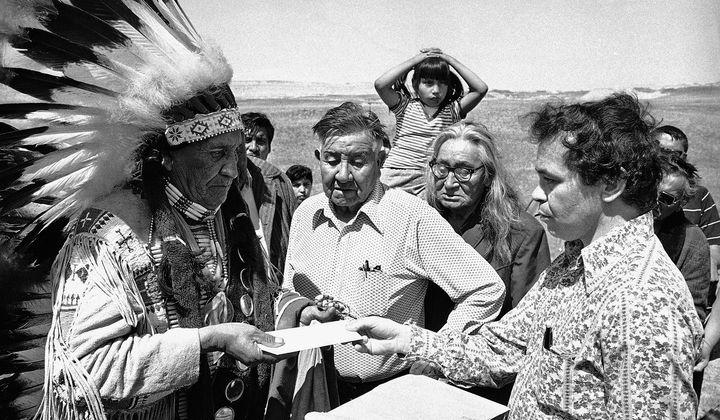 |
Canku Ota
|
 |
|
(Many Paths)
|
||
|
An Online Newsletter
Celebrating Native America
|
||
|
DECemBER 2020 - Volume
18 Number 12
|
||
|
|
||
|
"The Most Important
Indian"
In Memory of Hank Adams (1943 - 2020) |
||
|
by National Museum of
the American Indian
|
||
"An indispensable leader, an essential follower, and a brilliant strategist, he shaped more Native American civil, human, and treaty rights policies than most people even know are important or why." —The Northwest Treaty Tribes, honoring Hank Adams We mourn the passing December 21 and celebrate the life of Hank Adams (Assiniboine–Sioux, 1943–2020). Born on the Fort Peck Reservation in Montana and raised in Taholah, on the Quinault Reservation in Washington State, Adams is best known for his lifelong work to secure Native treaty rights, especially Northwest Coast tribes' treaty rights to fish their accustomed rivers and grounds. In the museum's book Nation to Nation: Treaties Between the United States and American Indian Nations, edited by Suzan Harjo (Cheyenne and Holdugee Muscogee), Adams cites treaty stories passed down by elders and "the words of tribal leaders captured in handwritten minutes of [19th-century] treaty council meetings" as enduring sources of strength for Native rights activists. Self-effacing and brave—he was arrested several times and shot during the Pacific Northwest Fish Wars—Adams worked to advance many other progressive causes, as well. In 1968, he served on the national steering committee of the Poor People's Campaign, organized by Martin Luther King. He helped resolve the American Indian Movement's occupation of the Bureau of Indian Affairs in 1972 and of Wounded Knee a year later. The "20 Points"—a summary of issues he drafted during the BIA negotiations—is still regarded as a key statement in the history of treaty rights. "Like most of the things he's written, the '20 Points' does not carry his name," Harjo says. "I asked him once if he minded other people taking credit for his stuff and he said, 'But that's really not the point of it all, is it?'" Vine Deloria Jr. (Standing Rock Sioux, 1933–2005) called Adams "the most important Indian" of that time and predicted that historians would recognize his contributions to the struggle for Indigenous rights. During the 1980s, Adams worked with the Miskito Indians in their campaign for self-determination in Nicaragua. Until his death, he advocated for Native young people's education about treaty history and rights and their participation in public affairs, and for Native communities' interests and voices in the debate about climate change. "How can we expedite solutions and alleviate the effects of climate change rather than simply accept a time schedule for everything bad to happen?" Adams asks in an exhibition and profile produced in 2017 for the project Legacy Washington. "Can we affect the rising ocean levels? Can we keep those villages in Alaska on beaches where they now are? Are we going to have to move them off? And if we have to move Miami, are we going to forget about those Indians and Natives on the Alaskan beaches? "There are a lot of things beyond your control, but you do what little you can with the little time that you have. But you also recognize that time is so short."
Northwest
Treaty Tribes |
||
|
|
|
|
||
|
|
||
| Canku Ota is a free Newsletter celebrating Native America, its traditions and accomplishments . We do not provide subscriber or visitor names to anyone. Some articles presented in Canku Ota may contain copyright material. We have received appropriate permissions for republishing any articles. Material appearing here is distributed without profit or monetary gain to those who have expressed an interest. This is in accordance with Title 17 U.S.C. Section 107. | ||
|
Canku Ota is a copyright ©
2000 - 2020 of Vicki Williams Barry and Paul Barry.
|
||
 |
 |
|
|
The "Canku
Ota - A Newsletter Celebrating Native America" web site and
its design is the
|
||
|
Copyright ©
1999 - 2020 of Paul C. Barry.
|
||
|
All Rights Reserved.
|
||
